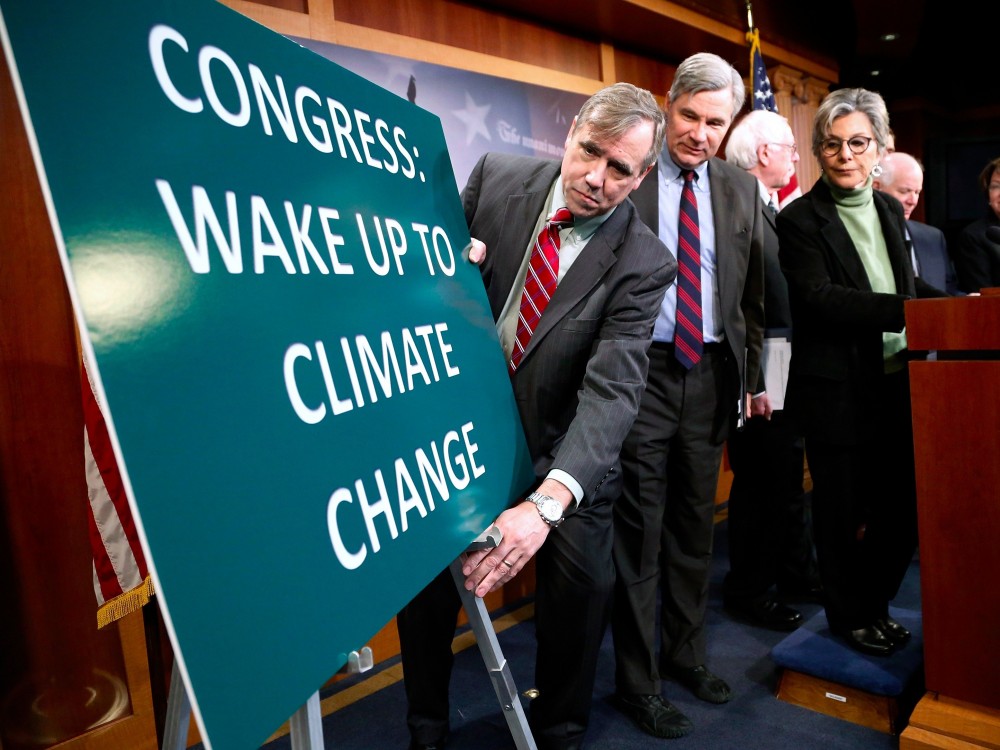Faced with a presidential debate season that lacked any real discussion of an issue that the current occupant of the White House, Barack Obama, has identified as a “terrifying” threat, a small but well-connected group of California activists have decided to take matters into their own hands.
They’re building a tool to raise voter awareness about where candidates stand on climate change and they’re focusing their attention not on the White House, but on the institution at the other end of Pennsylvania Avenue that’s been most resistant to respond to the problem.
Earlier this month, the group launched Climate Congress, a website that aims to provide basic information on where every incumbent member of the US House and Senate and their challengers stand on key environmental questions. The mostly volunteer team behind the project began with an aim of capturing information on the candidates in the 33 Senate seats that are up for grabs in November’s election as well as candidates for 51 competitive House races where there’s a significant difference between the candidates on climate issues. The site has its own Wiki, allowing for group collaboration on the project, and founders are encouraging the public to fill in missing information.
“Every day we are adding,” says Felix Kramer, a self-described “frustrated climate hawk” who helped get the site off the ground. “We’ve started to get crowdsourced information.” He says he and several allies, including Mike Mielke, who handles environmental issues for the influential Silicon Valley Leadership Group, decided to launch the site after discovering there is no one-stop shop for voters to learn where politicians stand on climate issues.
“The information is scattered around,” says Kramer, who sees that as a “sign that people don’t recognize the urgency and don’t think there is anything they can do.”
The site addresses the latter problem by calling for volunteers to help with a range of chores, from writing and editing to social media promotion. Researchers will help get information to answer three basic questions about each candidate for congressional office:
1.
What are the individual’s views on whether climate change is real and caused by human activity?
2.
What votes, actions and governmental/organizational activities on climate change and clean energy has the individual led/supported/opposed?
3.
What has the individual said about local and regional climate-related impacts and activities?
The effort is unique in its single-mindedness and comprehensiveness (unlike a tool like the League of Conservation Voters congressional scorecard, it focuses solely on climate change, and includes information on challengers). Kramer says he hopes crowdsourcing will keep the site nimble: Rather than waiting for a once-a-year compilation of roll call votes, Climate Congress can update as candidates change positions or make their positions known.
And unlike many other environmental groups, Climate Congress is organized as a nonpartisan 501(c)3. That means it can’t make endorsements, though Kramer says “our goal now is to show that what we’ve done so far can have some impact before Nov. 8” by motivating more voters to press candidates on climate change issues.
Already the project has gotten an influential thumbs-up from one of the nation’s best-known environmental activists, Bill McKibben.
Kramer, who says he got technical help creating the Wiki from the Wisconsin-based Center for Media and Democracy, encourages voters to adopt the list “bring it to your town hall and ask questions.” He plans to keep the project going well after the November 8 election and hopes that, over time, it will help elect more climate-change-minded senators and representatives.
Finding a gap in the ecosphere and taking it upon himself to plug it is typical for Kramer, a transplanted New Yorker who cut his teeth as an environmental advocate back east. While living in New York City, he says, he became director of a now-legendary effort that put a windmill atop a tenement. After heading west to join the California tech rush, founding an internet startup and selling it, Kramer has devoted himself full-time to environmental causes.
He drew national attention for CalCars, another DIY venture in which he and some like-minded tinkerers did automakers one better by taking apart a hybrid Prius and remaking it so it could be plugged into an electrical outlet and fitted with a longer-lived battery. The story of Kramer’s efforts earned him a chapter in the 2013 book about the clean energy economy, Apollo’s Fire, co-authored by Washington Gov. Jay Inslee, a Democrat. Former President Bill Clinton wrote the forward.
Now that automakers are manufacturing the cars of Kramer’s dreams, he has declared victory for CalCars and is looking for a new world to conquer.
Congress is hereby forewarned.
3 WAYS TO SHOW YOUR SUPPORT
- Log in to post comments












